#As is mandatory
Text
It's Complicated
Danny's in Gotham, Clockwork "for the good of the timeline" (he just likes seeing them tiny) turns Dan and Ellie about 7-12 ish and Jack and Maddie are off terrorizing the vampires in Romania.
Vlad has been both dragged along and is somewhat stalking Danny via 1. trying to make things right with him and attempting to actually Parent His Kids and to get Danny to stop lording it over his head. And 2. trying to also not get obliterated by the two little tykes by acting like, well, himself to Danny.
Jason is very interested in the new neighbor, for reasons that are Completely Professional and hold No Romantic Intentions. So he does a little digging. For security, of course.
He comes out of it horrified.
#dp x dc#dp x dc prompt#dpxdc#dp x dc crossover#dc x dp#dcxdp#Danny is mama#As is mandatory#danielle phantom#dan phantom#dead on main#good parents jack and maddie#vlad plasmius#misunderstanding#jason todd#Should I add some examples of Vlad Danny and the tykes creating horrible misunderstandings?#I kind of want to
2K notes
·
View notes
Text
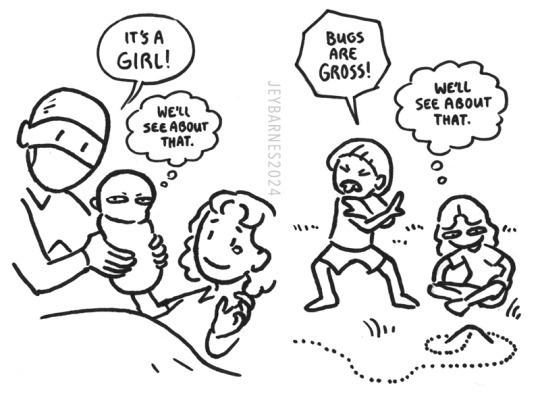

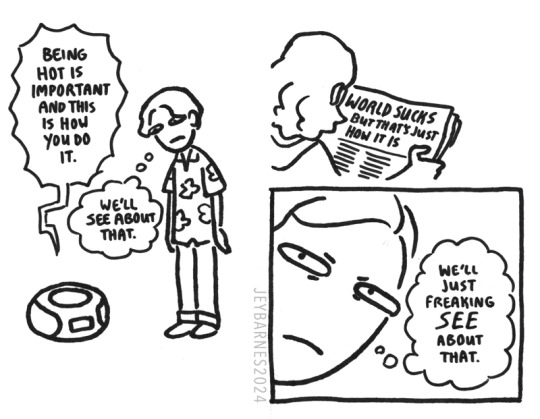
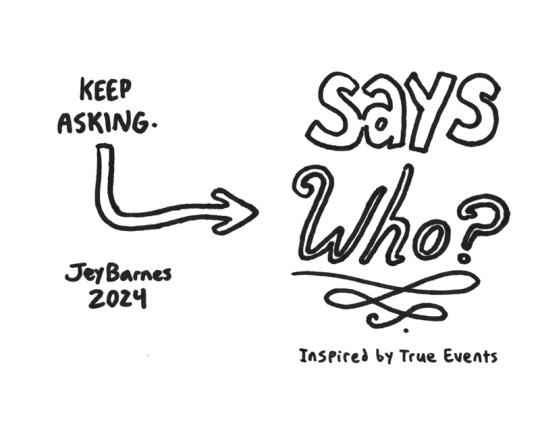
compelled yesterday to make a zine about a lifetime of being a contrarian little shit
sketched left-handed and inked right (ow)
#zines#no faster way to make me suspicious of a thing than to tell me it's mandatory#maybe it's autism maybe it's maybelline#comic
14K notes
·
View notes
Text
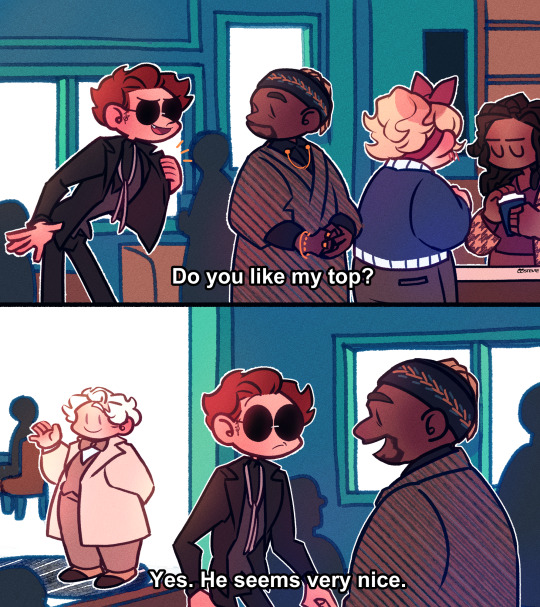
nice indeed 😇
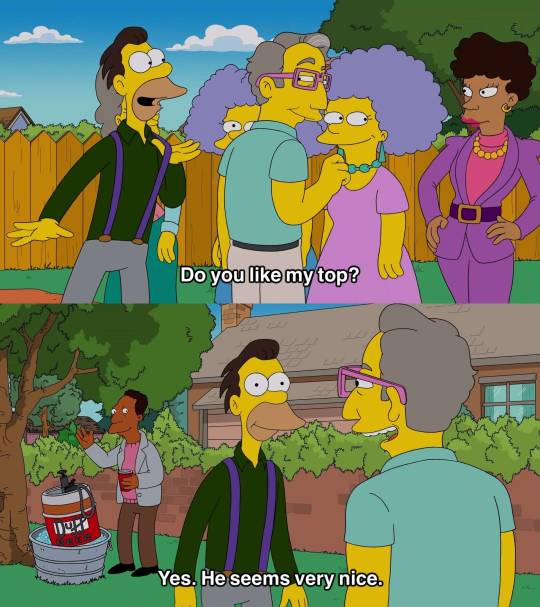
(everyone already knows what the reference is but still)
#good omens#aziraphale#crowley#mutt#maggie#nina#good omens 2#good omens fanart#mandatory disclaimer : this is a joke
9K notes
·
View notes
Text

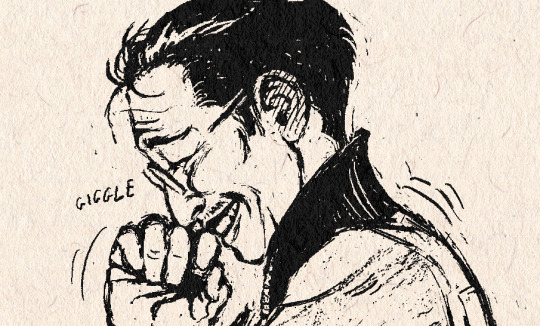

#[Kim's composure]: totally destroyed by whatever u just did mr du bois#my drawing#disco elysium#i love his shape with the cropped jacket#also mandatory: kim is hard to draw lol
10K notes
·
View notes
Text
*for non americans, that’s what you attend between the ages ~11-14 btw
33K notes
·
View notes
Text

they’re gonna trip at some point
+closeups!



#mandatory for me to untie their shoelaces#my art#fanart#spiderverse#across the spiderverse#atsv#miles morales#miles g morales#miles 42#ganke lee#joining the height difference bandwagon bc its funny#spiderman: atsv#spiderman: across the spiderverse#comic
13K notes
·
View notes
Text
In most places it’s illegal to make people disclose their sexual orientation or etc. when applying for a job. This applies to acting, because it is a job.
50K notes
·
View notes
Text
tumblr users will have the most inaccessible, unreadable, low contrast, flashing carrd you can possibly imagine, with a dni full of insider acronyms with no translation and numerous link buttons labelled with cryptic captions, and then go ahead and put “ableists dni and kys!” on that carrd
#yeah i’m bitter about carrds becoming so hostile to disabled people#nobody with vision issues or photosensitivity or processing issues or epilepsy or memory issues could possibly read your carrd#small changes like proper colour contrast between background and text can make a world of difference in making your page accessible#even just spelling out the acronyms in your dni or mentioning WHERE a mysterious link will actually lead is so helpful#i see so many links that are just random literary quotes that turn out to lead to a mandatory dni. how would anyone know that??#txt#accessibility#1000
6K notes
·
View notes
Text
How lock-in hurts design

Berliners: Otherland has added a second date (Jan 28) for my book-talk after the first one sold out - book now!

If you've ever read about design, you've probably encountered the idea of "paving the desire path." A "desire path" is an erosion path created by people departing from the official walkway and taking their own route. The story goes that smart campus planners don't fight the desire paths laid down by students; they pave them, formalizing the route that their constituents have voted for with their feet.
Desire paths aren't always great (Wikipedia notes that "desire paths sometimes cut through sensitive habitats and exclusion zones, threatening wildlife and park security"), but in the context of design, a desire path is a way that users communicate with designers, creating a feedback loop between those two groups. The designers make a product, the users use it in ways that surprise the designer, and the designer integrates all that into a new revision of the product.
This method is widely heralded as a means of "co-innovating" between users and companies. Designers who practice the method are lauded for their humility, their willingness to learn from their users. Tech history is strewn with examples of successful paved desire-paths.
Take John Deere. While today the company is notorious for its war on its customers (via its opposition to right to repair), Deere was once a leader in co-innovation, dispatching roving field engineers to visit farms and learn how farmers had modified their tractors. The best of these modifications would then be worked into the next round of tractor designs, in a virtuous cycle:
https://securityledger.com/2019/03/opinion-my-grandfathers-john-deere-would-support-our-right-to-repair/
But this pattern is even more pronounced in the digital world, because it's much easier to update a digital service than it is to update all the tractors in the field, especially if that service is cloud-based, meaning you can modify the back-end everyone is instantly updated. The most celebrated example of this co-creation is Twitter, whose users created a host of its core features.
Retweets, for example, were a user creation. Users who saw something they liked on the service would type "RT" and paste the text and the link into a new tweet composition window. Same for quote-tweets: users copied the URL for a tweet and pasted it in below their own commentary. Twitter designers observed this user innovation and formalized it, turning it into part of Twitter's core feature-set.
Companies are obsessed with discovering digital desire paths. They pay fortunes for analytics software to produce maps of how their users interact with their services, run focus groups, even embed sneaky screen-recording software into their web-pages:
https://www.wired.com/story/the-dark-side-of-replay-sessions-that-record-your-every-move-online/
This relentless surveillance of users is pursued in the name of making things better for them: let us spy on you and we'll figure out where your pain-points and friction are coming from, and remove those. We all win!
But this impulse is a world apart from the humility and respect implied by co-innovation. The constant, nonconsensual observation of users has more to do with controlling users than learning from them.
That is, after all, the ethos of modern technology: the more control a company can exert over its users ,the more value it can transfer from those users to its shareholders. That's the key to enshittification, the ubiquitous platform decay that has degraded virtually all the technology we use, making it worse every day:
https://pluralistic.net/2023/02/19/twiddler/
When you are seeking to control users, the desire paths they create are all too frequently a means to wrestling control back from you. Take advertising: every time a service makes its ads more obnoxious and invasive, it creates an incentive for its users to search for "how do I install an ad-blocker":
https://www.eff.org/deeplinks/2019/07/adblocking-how-about-nah
More than half of all web-users have installed ad-blockers. It's the largest consumer boycott in human history:
https://doc.searls.com/2023/11/11/how-is-the-worlds-biggest-boycott-doing/
But zero app users have installed ad-blockers, because reverse-engineering an app requires that you bypass its encryption, triggering liability under Section 1201 of the Digital Millennium Copyright Act. This law provides for a $500,000 fine and a 5-year prison sentence for "circumvention" of access controls:
https://pluralistic.net/2024/01/12/youre-holding-it-wrong/#if-dishwashers-were-iphones
Beyond that, modifying an app creates liability under copyright, trademark, patent, trade secrets, noncompete, nondisclosure and so on. It's what Jay Freeman calls "felony contempt of business model":
https://locusmag.com/2020/09/cory-doctorow-ip/
This is why services are so horny to drive you to install their app rather using their websites: they are trying to get you to do something that, given your druthers, you would prefer not to do. They want to force you to exit through the gift shop, you want to carve a desire path straight to the parking lot. Apps let them mobilize the law to literally criminalize those desire paths.
An app is just a web-page wrapped in enough IP to make it a felony to block ads in it (or do anything else that wrestles value back from a company). Apps are web-pages where everything not forbidden is mandatory.
Seen in this light, an app is a way to wage war on desire paths, to abandon the cooperative model for co-innovation in favor of the adversarial model of user control and extraction.
Corporate apologists like to claim that the proliferation of apps proves that users like them. Neoliberal economists love the idea that business as usual represents a "revealed preference." This is an intellectually unserious tautology: "you do this, so you must like it":
https://boingboing.net/2024/01/22/hp-ceo-says-customers-are-a-bad-investment-unless-they-can-be-made-to-buy-companys-drm-ink-cartridges.html
Calling an action where no alternatives are permissible a "preference" or a "choice" is a cheap trick – especially when considered against the "preferences" that reveal themselves when a real choice is possible. Take commercial surveillance: when Apple gave Ios users a choice about being spied on – a one-click opt of of app-based surveillance – 96% of users choice no spying:
https://arstechnica.com/gadgets/2021/05/96-of-us-users-opt-out-of-app-tracking-in-ios-14-5-analytics-find/
But then Apple started spying on those very same users that had opted out of spying by Facebook and other Apple competitors:
https://pluralistic.net/2022/11/14/luxury-surveillance/#liar-liar
Neoclassical economists aren't just obsessed with revealed preferences – they also love to bandy about the idea of "moral hazard": economic arrangements that tempt people to be dishonest. This is typically applied to the public ("consumers" in the contemptuous parlance of econospeak). But apps are pure moral hazard – for corporations. The ability to prohibit desire paths – and literally imprison rivals who help your users thwart those prohibitions – is too tempting for companies to resist.
The fact that the majority of web users block ads reveals a strong preference for not being spied on ("users just want relevant ads" is such an obvious lie that doesn't merit any serious discussion):
https://www.iccl.ie/news/82-of-the-irish-public-wants-big-techs-toxic-algorithms-switched-off/
Giant companies attained their scale by learning from their users, not by thwarting them. The person using technology always knows something about what they need to do and how they want to do it that the designers can never anticipate. This is especially true of people who are unlike those designers – people who live on the other side of the world, or the other side of the economic divide, or whose bodies don't work the way that the designers' bodies do:
https://pluralistic.net/2022/10/20/benevolent-dictators/#felony-contempt-of-business-model
Apps – and other technologies that are locked down so their users can be locked in – are the height of technological arrogance. They embody a belief that users are to be told, not heard. If a user wants to do something that the designer didn't anticipate, that's the user's fault:
https://www.wired.com/2010/06/iphone-4-holding-it-wrong/
Corporate enthusiasm for prohibiting you from reconfiguring the tools you use to suit your needs is a declaration of the end of history. "Sure," John Deere execs say, "we once learned from farmers by observing how they modified their tractors. But today's farmers are so much stupider and we are so much smarter that we have nothing to learn from them anymore."
Spying on your users to control them is a poor substitute asking your users their permission to learn from them. Without technological self-determination, preferences can't be revealed. Without the right to seize the means of computation, the desire paths never emerge, leaving designers in the dark about what users really want.
Our policymakers swear loyalty to "innovation" but when corporations ask for the right to decide who can innovate and how, they fall all over themselves to create laws that let companies punish users for the crime of contempt of business-model.
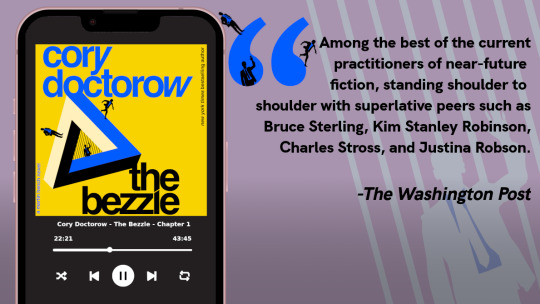
I'm Kickstarting the audiobook for The Bezzle, the sequel to Red Team Blues, narrated by @wilwheaton! You can pre-order the audiobook and ebook, DRM free, as well as the hardcover, signed or unsigned. There's also bundles with Red Team Blues in ebook, audio or paperback.

If you'd like an essay-formatted version of this post to read or share, here's a link to it on pluralistic.net, my surveillance-free, ad-free, tracker-free blog:
https://pluralistic.net/2024/01/24/everything-not-mandatory/#is-prohibited

Image:
Belem (modified)
https://commons.wikimedia.org/wiki/File:Desire_path_%2819811581366%29.jpg
CC BY 2.0
https://creativecommons.org/licenses/by/2.0/deed.en
#pluralistic#desire paths#design#drm#everything not mandatory is prohibited#apps#ip#innovation#user innovation#technological self-determination#john deere#twitter#felony contempt of business model
3K notes
·
View notes
Text
HAPPY NEIL BANGING OUT THE TUNES DAY TO EVERYONE!! :D
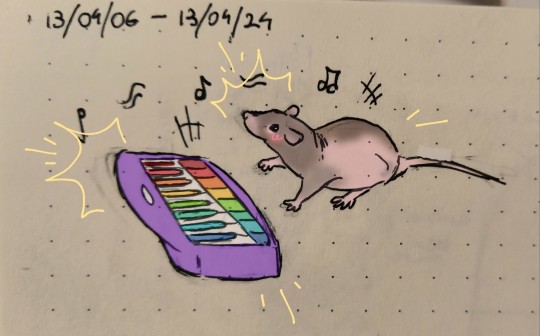
doodled instead of studying!!!!!!!!!! because this is more important!!!!
#finally posting something in time#whew#neil banging out the tunes#lemon demon#neil cicierega#<-sorry im a ld fan its mandatory i tag those#delta draws#413#april 13#tumblr holidays
2K notes
·
View notes
Text
i don't miss the actual act of smoking cigarettes, but i miss all the intricate rituals surrounding it and the instant sense of kinship you feel with other smokers. smacking the box before opening it to wake the cancer up/pack the tobacco down; bumming a cig off someone else and learning more about them from their brand of choice than you ever would from their star sign; someone else at the smoking corner watching you dig for your lighter and wordlessly offering theirs instead; little bite-sized conversations with strangers that can end with the cig that started them or be prolonged by lighting another... humanity really went off with tobacco
14K notes
·
View notes
Text


Fall essentials 🍂🍁
#hit a new max on squats so let’s celebrate with a little midweek slutty moment#flannels and jockstraps are mandatory this fall y’all#not face
4K notes
·
View notes
Text
With the holidays coming up this is everyone’s reminder to
Ask little kids if they’d like a hug first
If they say no, verbally affirm the reasonable shit you just heard. “You said you wouldn’t like a hug. We won’t hug.”
You don’t even have to redirect with a high five, even though that’s fine. Touching isn’t for everyone.
Do not say upsetting things like “where is my hug?” Clown, you don’t own hugs.
It is fine to model consent by placing boundaries on touch. “Let’s wash your hands before we cuddle.” “I’m leaving this couch if you continue to yeet your foot into my pregnant belly.” “that was fun but I’m going to take a break now.”
Touchy children are not inherently sweeter. Love languages exist at any age.
Some kids like touch but not eye contact. A hug from behind is a good one or “let’s close our eyes and squeeze really tight. Ready?”
I’m dead f*ing serious there are people who want your physical affection so badly but need you to modify your approach. Just like there are people who want to get into buildings but need ramps.
Don’t comment if a kid shows affection to another adult but not you. They’re weird like that but you don’t have to make it weirder.
#holiday psa#consent#you gotta do it#hugs are cool but not mandatory#disability awareness#mom posting#kindness
19K notes
·
View notes
Text
you hate it when wyll calls himself "the blade" because you think it's cringe to talk about yourself in third person. i hate it when wyll calls himself "the blade" because i want him to stop thinking of himself as a hero-object and start seeing the value in wyll ravengard. we are not the same
#bg3#baldurs gate 3#wyll ravengard#overflowing trashcan#mandatory 'this is a joke post'#anyway. you fools. the cringier he is the more i want him
2K notes
·
View notes
Text
Tiny skk adventures!
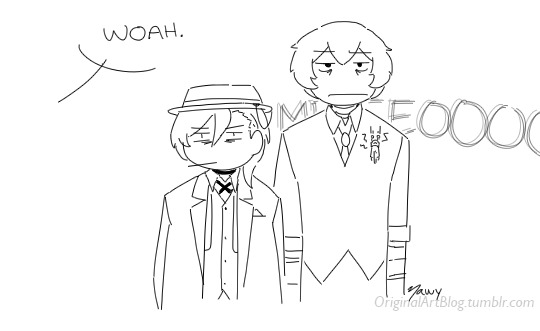
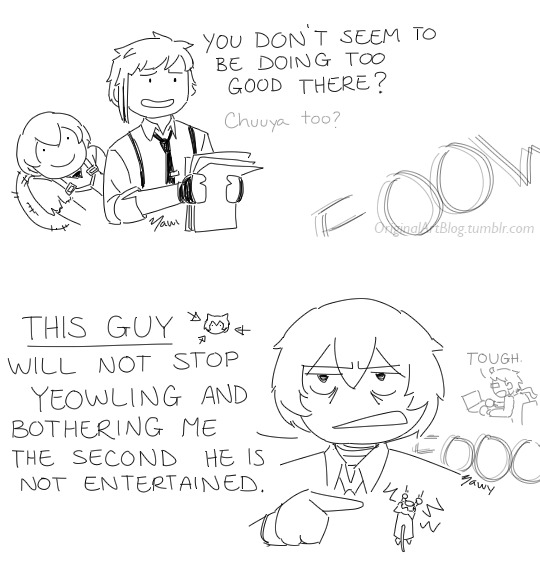

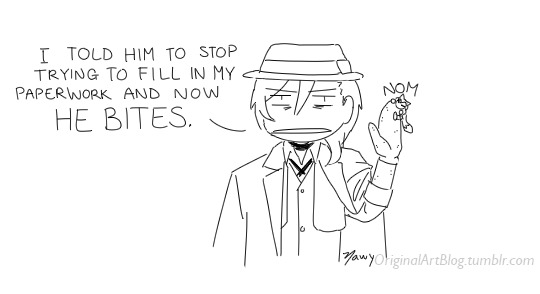

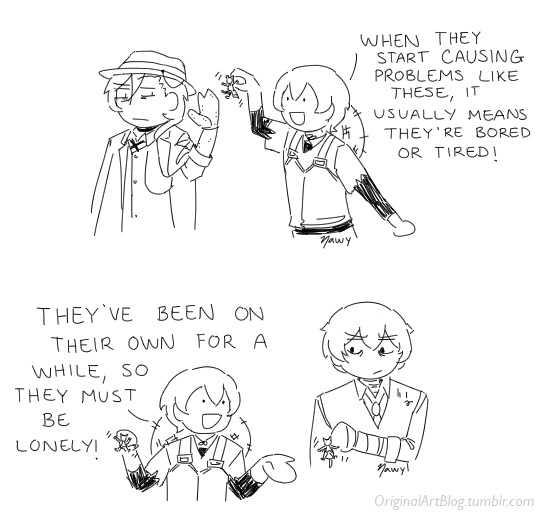
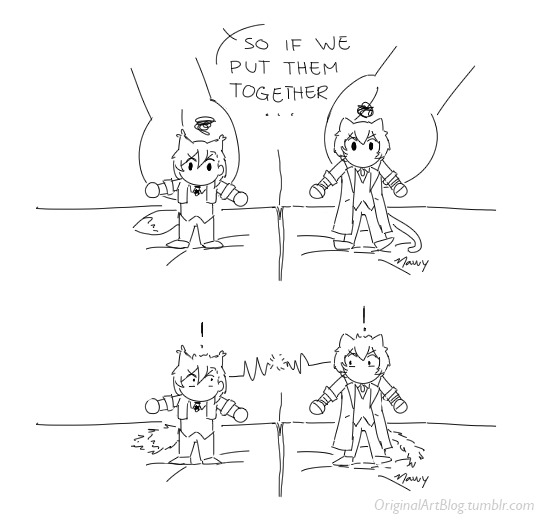
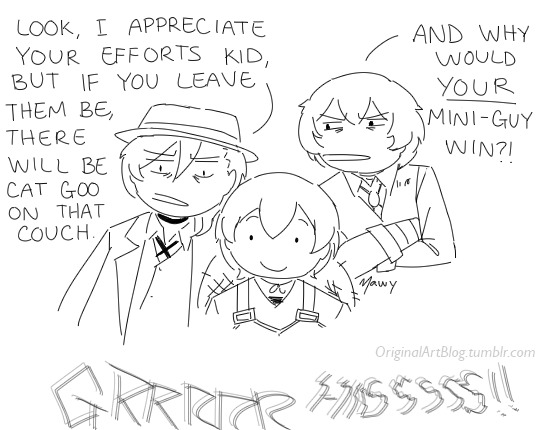
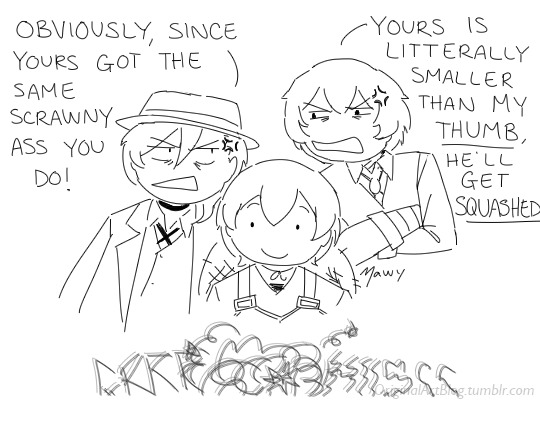
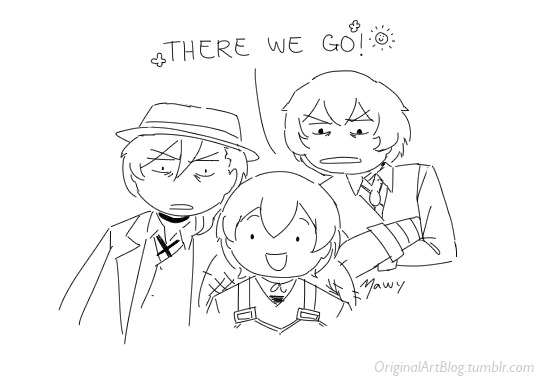
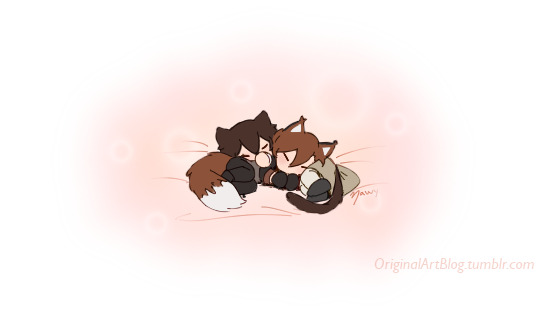
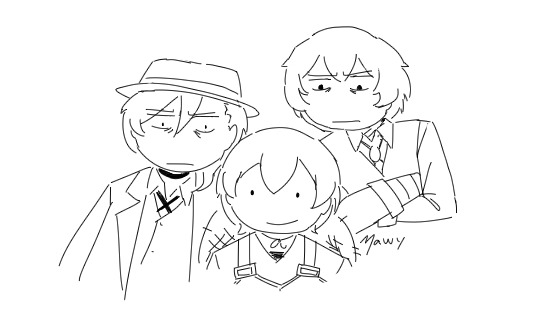
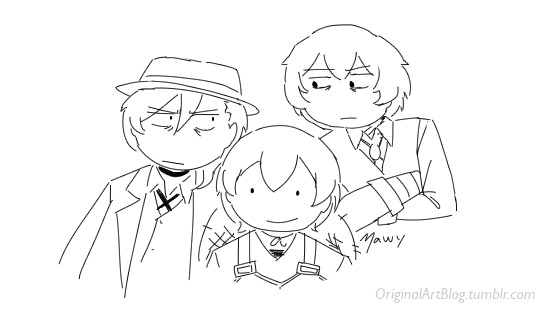

not like they're also cranky and tired and touch-starved
#tiny skk adventures#''why is chuuya at the ada'' you're asking too many questions. why is any of this happening.#this skk flavour (like most i offer) comes with a free choice of romantic platonic something in-between or whatever else you may want#but here the longing is mandatory#bsd#bungo stray dogs#bungou stray dogs#bsd fanart#bsd dazai#bsd dazai osamu#bsd chuuya#bsd nakahara chuuya#skk#soukoku#and friends#nawy's comics#AH DANG I FORGOT TO WRITE#dedicated to remi who's enabling me and bombarding me with ideas for the tinies
5K notes
·
View notes
Text

if 'photorealistic' fur and feathers are rendered like this its likely ai
3K notes
·
View notes